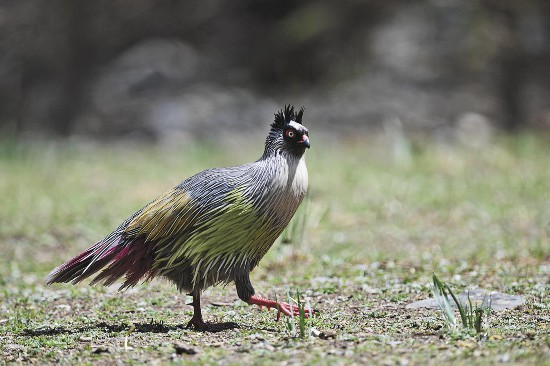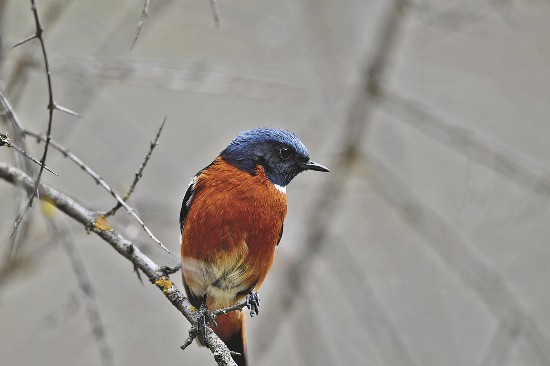




- BRNN
- BRI News
- BRNN News
- Database
Official Documents Polices and Regulations
Inter-government Documents International Cooperation BRI Countries
Business Guide Economic Data BRI Data
Trade
Investment Projects Latest projects
Cases - Content Pool

Photo shows a blood pheasant in Zhugusi village, Zhugu township, Menyuan county, Haibei Tibetan Autonomous Prefecture, northwest China's Qinghai Province. (Photo/Qinghai Daily)
Wang Guozhong, 45, is a villager from Zhugusi village, Zhugu township, Menyuan county, Haibei Tibetan Autonomous Prefecture, northwest China's Qinghai Province. This area, part of the Qinghai section of the Qilian Mountain National Park candidate zone, is rich in ecological resources with vast forests that serve as breeding grounds for many bird species.
Leveraging these natural resources, Wang has become a bird guide.
After graduating in 2000 from a vocational and technical school in Huzhu Tu Autonomous County, Qinghai, Wang returned to his village as a doctor. In 2019, he became a ranger at the Sigou Ecological Management and Protection Station. While patrolling, he began photographing birds in the forest using his phone.
In 2020, Wang bought a secondhand camera. He shared photos of birds taken by him to the Qinghai management bureau of the Qilian Mountain National Park and posted nearly 100 videos of birds on social media.
That same year, the management bureau equipped Wang with a Nikon D850 and a 60–600mm lens. Thrilled, he immersed himself in bird photography, spending every free moment in the woods observing and capturing birds through the seasons.

A white-throated redstart rests on a tree branch in Zhugusi village, Zhugu township, Menyuan county, Haibei Tibetan Autonomous Prefecture, northwest China's Qinghai Province. (Photo/Qinghai Daily)
Wang's reputation grew among birdwatchers, drawing many enthusiasts from afar. "At first, photographers stayed on the clay kang, a traditional heated bed, in my home, and I took them birdwatching. Later, they encouraged me to renovate my house and become a bird guide," Wang said.
In 2023, Wang renovated his house, converting it into standard rooms with underfloor heating. As a bird guide, he now hosts photography enthusiasts. Standard rooms are priced at 180 yuan (about $25) per night, with meals costing 80 yuan per person per day. Guiding fees vary depending on how many bird species are photographed—the more birds spotted, the higher the fee.
Wang has observed not only more species but also growing bird populations.

Wang Guozhong cleans a camera lens at home in Zhugusi village, Zhugu township, Menyuan county, Haibei Tibetan Autonomous Prefecture, northwest China's Qinghai Province. (Photo/Qinghai Daily)
"For example, when I started photographing the Chinese grouse, there were four; now there are nine," he said. Feeding chickens and scattering grain in his yard attracts seven to eight bird species. Since he began, Wang has recorded over 80 bird species.
"The last group of five photographers from Guangzhou, south China's Guangdong Province left just last month," he said. Since last November, Wang has earned over 100,000 yuan from bird guiding, turning ecological resources into wealth.
From November to April, as the birds migrated from the mountains to the plains, Wang's business hits its peak, with all five standard rooms fully booked. He hopes more young villagers will take up bird guiding and turn the region's ecological resources into income.

Tel:86-10-65363107, 86-10-65368220, 86-10-65363106